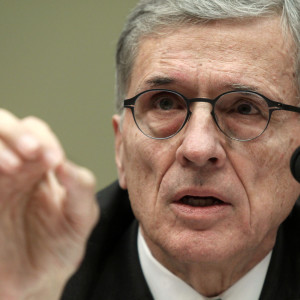Federal Communications Commission Chairman Tom Wheeler said it was “damn important” the U.S. lead the world in deploying the next generation of wireless networks Monday, and announced a new proposal he’ll bring before the FCC in July to expand 5G for everything from virtual reality to the Internet of Things.
During a speech at the National Press Club Monday, Wheeler said he’ll circulate his “Spectrum Frontiers” plan for boosting 5G deployment to his fellow commissioners Thursday, and schedule a vote on the proposal to open up high-band spectrum for 5G for the FCC’s July 15 open meeting.
“If the commission approves my proposal next month, the United States will be the first country in the world to open up high-band spectrum for 5G networks and applications,” Wheeler said. “And that’s damn important because it means U.S. companies will be first out of the gate.”
Wheeler opened the speech by describing how months ago, he helmed an excavator in Texas digging up dirt — all while wearing a suit inside the offices of the FCC in Washington, D.C. He said the feat was made possible by VR, which, like the Internet of Things, autonomous vehicles and technology we haven’t even imagined yet, will only be possible if the FCC prepares the way for 5G.
“Granted, remotely digging dirt in Dallas probably isn’t high on the list of transformational advancements that will define the 21st century,” the chairman said.
“But what if you replace the heavy machinery with a scalpel so a world-class surgeon can move from hospital to hospital without leaving her own surgery suite?” he continued. “Or how about students sitting in a classroom taking a virtual tour inside the human body? Or something I did last week at Stanford’s VR lab where I stood next to the Stanford quarterback as play after play developed, and I read the defense and made split-second decisions?”
Those will require wireless speeds “10 to 100 times faster than today,” according to the chairman, with far more high-band spectrum than is currently available.
Finding it will mean utilizing high-frequency millimeter wave bands in the multi-gigabits per-second range (essentially the same as a high-speed wired fiber connection), with latency reduced to the millisecond range across varying distances, allowing for wireless 4K video and virtual reality streaming.
That technology will require more infrastructure making use of small cell networks to catch and bounce high-band frequencies — typically weak when not moving in a straight lines — and more spectrum sharing.
Wheeler explained while typical blocks of licensed low-band spectrum are usually 5 to 10 MHz in width, 5G blocks will be more like 200 MHz, and provide for more and faster backhaul carrying internet data to cell towers.
The July plan will seek comments on opening up other high-frequency bands, propose making a 14 gigahertz unlicensed spectrum band for shared use and seek rules for spectrum sharing between satellite, mobile and federal entities.
Wheeler added the commission has already sped its process for approving applications to build tower sites, and said his pending proposal for new rules over the high-capacity business internet market will guarantee wireless providers have access to the backhaul they need for 5G at an affordable price.
“These backhaul connections can be as much as 30 percent of the cost of operating a wireless network,” Wheeler said. “And with the additional sites required to support use of the millimeter wave spectrum, that percentage is likely to increase, to as much as 50 percent.”
Many view the business broadband rules as an outgrowth of the agency’s net neutrality rules upheld in a federal appeals court last week, aimed at giving the FCC the power to regulate the rates larger providers like Verizon and AT&T charge smaller providers like Sprint to lease parts of their networks.
“Competition in the supply of backhaul remains limited, and that can translate into higher prices for wireless networks and then higher prices for consumers,” he said. “Lack of competition doesn’t just hurt the deployment of wireless networks today, it threatens as well to delay the buildout of 5G networks with its demand for many, many more backhaul connections to many, many more antennae.”
An industry study found Wheeler’s proposed business broadband rules could delay deployment of next-gen networks, costing billions in investment and thousands of jobs.
Wheeler said the agency will vote on the new business broadband rules before the end of the year.

